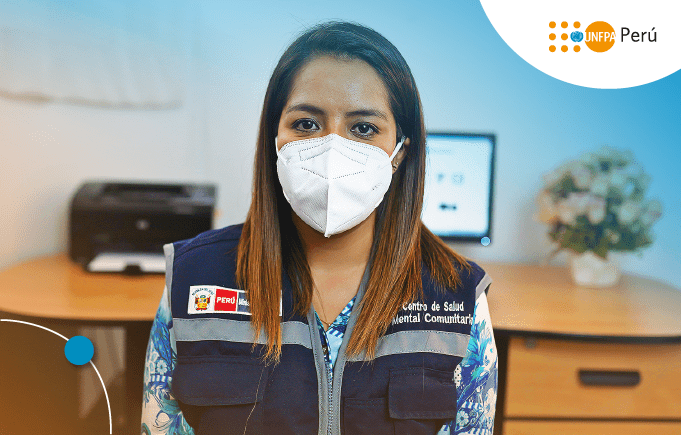Nearly every morning for the past six years psychiatrist Gabriela Gonzales has been going to the Honorio Delgado Community Mental Health Center (CMHC) in Jesus Maria. Over the last year, however, the walk has had a different touch.
On her way to the Health Center seeing other pedestrians wearing the same face masks and shields she is wearing too to protect themselves; she is reminded by the real dangers of being exposed to COVID-19 on a daily basis.
Nevertheless, the pandemic did not make her give up her profession; on the contrary, she has become more determined to work towards improve the lives and mental health of people, especially women.
The women, who attend Ms. Gonzales’ Health Center, are often survivors of the violence that many women in Peru have to face. According to the National Observatory on violence against women and their family members, between January and September 2020, almost 70% (34,098) of all cases managed at CMHC´s in Peru, were cases of women survivors of violence.
In addition, in 2020, 54.8 % of women between the ages of 15 to 49 reported having suffered physical, psychological or sexual violence by their partners, at least once, according to the 2020 Peru Demographic and Health Survey (ENDES).
Upon arriving at the health center, the psychiatrist meets the first group of persons; many of whom are survivors of violence at the very beginning of their recovery process waiting to be attended to by a psychiatrist after first having undergone a health examination.
In addition to adult women, many survivors of violence attended to at the CMHC´s are children and adolescents. For Ms. Gonzales it is a reminder that one of them could also be her own daughter, which is why she is also applying her professional knowledge and skills on the prevention of violence at home.
One of the ways she is applying her skills at home is by sharing child care responsibilities equally with her husband as well as educating her daughter on her right to live a life free of all forms of violence and discrimination. “We teach her, for example, that no one should touch her body without her permission, not even a relative,” she says.
Supporting girls, adolescents and women
It's not easy to show empathy while wearing a protective suit, face mask and face shield, but Gabriela triesher best with each patient.
Her office, decorated with posters of empowering phrases, has seen many recovery stories.
"I have seen and treated mild, moderate and severe cases of violence. I remember the case of a patient who had experienced several forms of violence. Apart from psychological violence, she also suffered from physical and sexual violence. Like other women I have treated, she was very emotional. We supported her in recovering her mental and physical health," says the psychiatrist.
She remembers this case as one of many that prove that good quality care and empathy are crucial. “I have kept a stone that she brought me from the hot springs, during an empowering trip she made after having had the courage to ask for help and follow through with her therapy. For her, that stone symbolized the process she had gone through. Today, she is well aware of her rights,” she states.
Strengthening case management with the support of government and international partners
Gabriela has had the opportunity to strengthen her case management skills, and in particular her knowledge on the rights and needs of survivors, through a training provided by the Ministry of Health (MINSA) and is now applying these skills in her daily work at the Health Center.
Indeed, the Ministry of Health together with the United Nations Population Fund (UNFPA) has contributed to strengthening the health care response to gender-based violence by training health care personnel in multisectoral case management. In addition, the regulatory framework in the health sector has been strengthened and pilots of joint case management combining socio-legal services supported by the Ministry of Women with health care services, have been implemented.
“I am very happy about having participated in the training sessions. I learned a lot about the guidelines for mental health care for women experiencing violence, as well as about a set of regulations supporting GBV case management at health facilities,” says the psychiatrist.
Today, Dr. Gonzales is even more aware of the important role of the health sector in the prevention and response to gender-based violence. “Now we know that the response to GBV is a priority area for the health sector,” she stresses. Especially in times of COVID-19, which has put a hold on many things in our daily lives, but not on violence, it is important all of Dr. Gonzales’ colleagues are aware of the importance of prevention and response to GBV.
“At the health care facility, survivors of violence can explain their worries without pressure. We work in a comprehensive way, without re-victimizing survivors or exposing them to the aggressor,” she emphasizes.
She has also reviewed medical histories with some specialists from the multidisciplinary team (psychiatrists, psychologists, family physicians, social workers and nurses) and confirms: “Each well managed case is an opportunity for improvement, so that, little by little, girls, adolescents and women can live free of violence”.
When returning home in the evenings, Gabriela plays with her little daughter. It is the best time of her day. Due to the pandemic, she sometimes has to attend virtual meetings from home, but she stays motivated knowing that she is working for a greater good.
She sums up her call for her profession: “It is a joy when women complete the recovery process as their personal achievement.”


